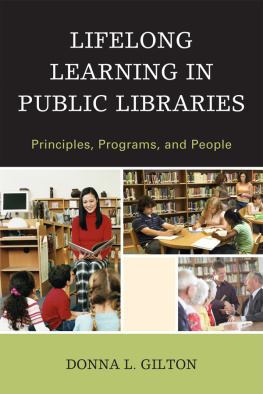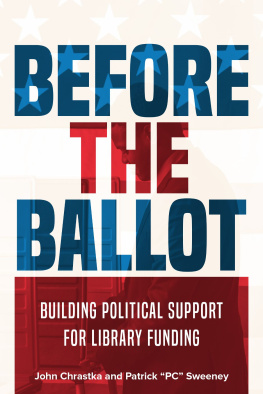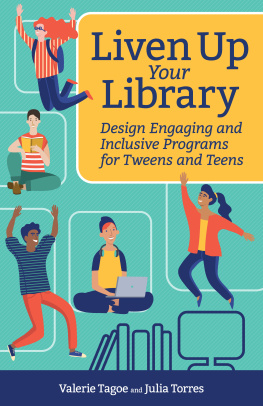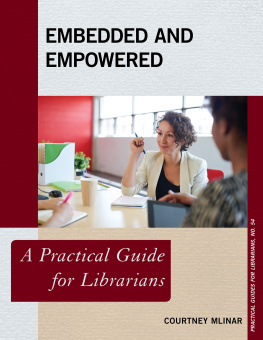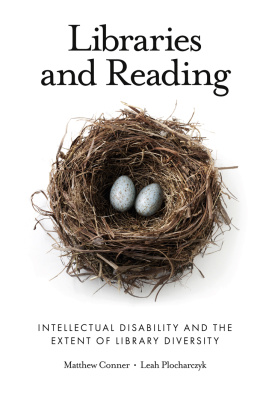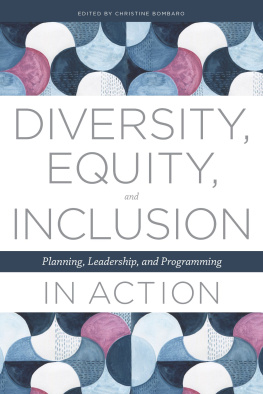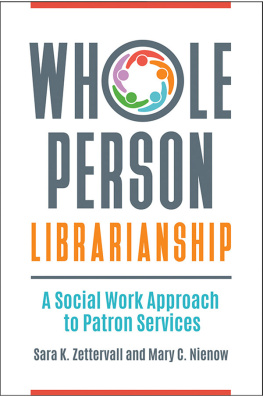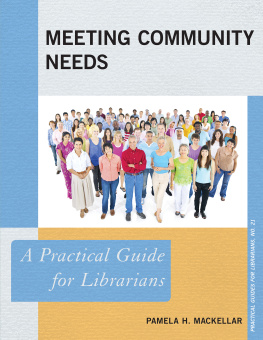
Social Justice and Activism in Libraries
Essays on Diversity and Change
Edited by SU EPSTEIN, CAROL SMALLWOOD and VERA GUBNITSKAIA
Foreword by Wanda Kay Brown

McFarland & Company, Inc., Publishers
Jefferson, North Carolina
RECENT MCFARLAND WORKS OF INTEREST (MAIN TITLES)
Genealogy and the Librarian, edited by Carol Smallwood and Vera Gubnitskaia (2018); Gender Issues and the Library, edited by Carol Smallwood and Lura Sanborn (2017); Library Partnerships with Writers and Poets, edited by Carol Smallwood and Vera Gubnitskaia (2017); Teaching Technology in Libraries, edited by Carol Smallwood and Lura Sanborn (2017); Library Volunteers Welcome! edited by Carol Smallwood and Lura Sanborn (2016); Continuing Education for Librarians, edited by Carol Smallwood, Kerrol Harrod and Vera Gubnitskaia (2013); Job Stress and the Librarian, edited by Carol Smallwood and Linda Burkey Wade (2013); Marketing Your Library, edited by Carol Smallwood, Vera Gubnitskaia and Kerrol Harrod (2012); Mentoring in Librarianship, edited by Carol Smallwood and Rebecca Tolley-Stokes (2012); Women on Poetry, edited by Carol Smallwood, Colleen S. Harris and Cynthia Brackett-Vincent (2012)
LIBRARY OF CONGRESS CATALOGUING DATA ARE AVAILABLE
BRITISH LIBRARY CATALOGUING DATA ARE AVAILABLE
e-ISBN: 978-1-4766-3510-1
2019 Su Epstein, Carol Smallwood and Vera Gubnitskaia. All rights reserved
No part of this book may be reproduced or transmitted in any form or by any means, electronic or mechanical, including photocopying or recording, or by any information storage and retrieval system, without permission in writing from the publisher.
Front cover photograph 2019 Rawpixel/Shutterstock
McFarland & Company, Inc., Publishers
Box 611, Jefferson, North Carolina 28640
www.mcfarlandpub.com
Foreword
WANDA KAY BROWN
Recently I was invited to address an Inclusion Committee at a local retirement facility in North Carolina. While the host was introducing me, a question arose from a non-committee member asking about the mission of the committee. The host shared her story on the importance of inclusion and how it relates to understanding other cultures. From the conversations that followed, it was obvious that there remains a vital need to continue community dialogues on race and inclusion. These authors have done an impressive job in compiling a spectacular showcase of library initiatives designed to address issues of social justice and activism. They are truly to be applauded for their efforts. Those librarians electing to share their stories are also true champions. From each essay, a new set of champions is revealed. These authors are representative of those who have seriously attempted to implement programs and services designed to move us from thought to action. They are librarians and library workers who have graciously agreed to share their efforts with the rest of us. It is from these stories that we gain a deeper insight around advocacy efforts as it relates to social justice, diversity and inclusion. The stories shared within this book provide the reader with an insiders take on setting goals, exploring options, strategizing, and following a plan through to fruition. The authors also offer practical advice around program planning and sensitivity tips for introducing complex and often times controversial conversational topics. Every library type is represented within the stories shared, and support for outreach efforts is clearly perceivable.
Libraries are valued and respected for their ability to inform, engage, and connect their community of users around topics and issues that are required to be successful. We accomplish our mission through a variety of ways. Most notably our efforts have been concentrated within collection building and through a myriad of program offerings. It is so refreshing to see these authors challenge the standard. Through the stories shared within Social Justice and Activism in Libraries: Essays on Diversity and Change, we see libraries implementing new approaches. We see an increase in collaborations with community partners. The authors meticulously outline their thought and strategy process, and detail how their institutions aligned their efforts with others who shared similar commitments and interest. They leverage those partnerships to foster one on one engagement. They provide the platform to lead the community through difficult and challenging conversations. They lead staff through training on how implicit bias is ubiquitous.
Partnering remains key to our professions continued success. These stories demonstrate how effective partnerships strengthen our voice, expand our ability to reach, and most importantly, demonstrate our professions value. Their stories are representative of libraries with leaderships that encourage and support open and sincere engagement, actively seek a greater understanding of cultures, and specifically recognize and accept their role in advancing social justice for all. Each story provides a roadmap to a strategy that leads the community on the path from thinking about diversity to an action that reveals a deeper connection with diversity.
Wanda Kay Brown is the president-elect of the American Library Association, 20192020, and the director of library services for the C. G. OKelly Library, and was the associate dean of Wake Forest Universitys Z. Smith Reynolds Library. She has served as president of the North Carolina Library Association and president of the Black Caucus of the American Library Association.
Preface
SU EPSTEIN, VERA GUBNITSKAIA and CAROL SMALLWOOD
In a changing world, with multiple and often conflicting voices, the librarys important role as a location of safety and inclusion as well as a crusader for knowledge cannot be overstated. It can be easy to reflect on differing perspectives in our collections and displays, but if we do not practice our values, we are lacking. As leaders in our communities, we, librarians, have an obligation to educate and inform; we must be ready to lead and model the principles we support. The question that arises for many is: how?
It is our hope that the essays in this book offer the foundation and inspiration to move our actions beyond a diverse collection development and social issues displays. We hope as you read this collection that it will motivate you to consider the assumptions you may take for granted, work to support change in our organizations, and seek out creative new programs.
For years we have heard the stories of how libraries and librarians have changed peoples lives. We need to ensure that we continue this important role.
Social Justice and Activism in Libraries: Essays on Diversity and Change came about after the lead editor, Su Epstein, recognized the need for a collection written by experienced, practicing librarians in the field. Essays were sought from U.S. academic, public, school, special librarians, and LIS faculty, on the role they can play in social justice and social change, activities supporting tolerance.
The essays are arranged by: Part IBringing Underrepresentation to the Forefront; Part IIEstablishing Partnerships; Part IIIBuilding Communities; Part IVAdministering with Diversity; Part VSupporting Activism; Part VIGenerating Programming; and Part VIIExpanding Teaching.
Next page


